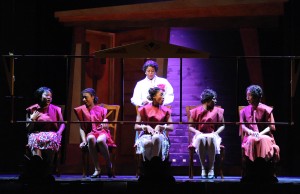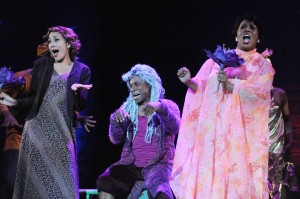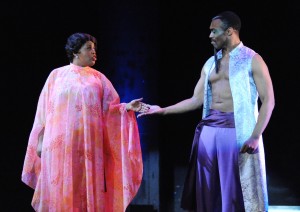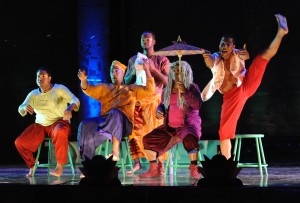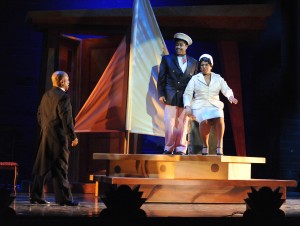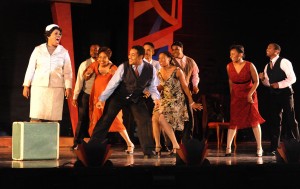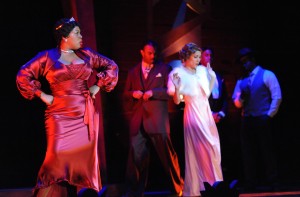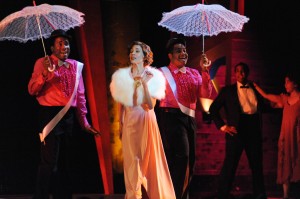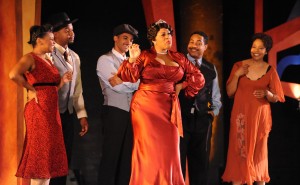THE DUKE WHO WAS A KING
A blast from the “big band” past, Queenie Pie is the great late Duke Ellington’s sole–if unfinished’”opera, recently revived in Los Angeles. On February 15, Chicago Opera Theater (COT), in a co-production with Long Beach Opera, takes that reclamation effort to the Harris Theater in Millennium Park, with the Chicago Jazz Orchestra delivering the all-important orchestrations.
Whatever the merits of the second coming of a one-time opera, it’s a great excuse to rekindle respect for an American musical master and the glorious notes he gave us. “Take the ‘A’ Train,” “Mood Indigo,” “It Don’t Mean a Thing (If It Ain’t Got That Swing),” “Solitude,” “In a Sentimental Mood,” “Caravan,” “Black, Brown and Beige,” “I Let A Song Go Out of My Heart”’”these are as much national anthems as the one about a fort bombardment.
But first Queenie Pie: After achieving by the 1960s every kudo that the swing era could offer, Ellington found himself drawn to the respectability of opera (just as Scott Joplin was in 1917 with Treemonisha, his then-unperformed last offering). New York public television station WNET gave Ellington a chance at operatic glory with a 1962 commission as a television piece with Lena Horne. But, after seven years of work with librettist Betty McGettigan, Queenie Pie remained unfulfilled when the composer died in 1974. (Different versions were devised in 1986, 1993, and 2008. The COT version uses McGettigan’s presumably authoritative 2009 version, written for the Butler Opera Center at the University of Texas at Austin. It also interpolates other Ellington pieces into a new adaptation of the libretto by Ken Roht.)
“Queenie Pie is a neglected gem, fascinating musically, dramatically and historically,” said Andreas Mitisek, COT’s General Director. “In keeping with our mission of producing adventurous opera experiences, particularly new and rarely performed work, we are excited to bring Chicago audiences a largely unknown piece by one of America’s greatest composers.” But, however much it may trail clouds of glory, director Roht doesn’t intend to preserve Queenie Pie as a nostalgic period piece set in amber: “The goal is to contemporize the piece, and also to make the piece timeless, while dealing with challenging social issues that seem to persist.”
The Duke’s inspiration came from Madam C. J. Walker (1867-1919), a Harlem beautician who invented a preparation to straighten hair, and who is cited by the Guinness Book of Records as the first woman to become a self-made millionaire. Its tangled plot centers on the irrepressible career of hair impresaria/corporate diva Queenie (Karen Marie Richardson), a moguless who created a beauty-product empire that combined the mail-order efficiency of Sears Roebuck with the intimate customer contact of pre-Avon door-to-door sales campaigns. Her fame triggers a rivalry for follicle fame which the opera chronicles in all directions. The business–peddling beauty dreams and the right conditioners to achieve them–suddenly faces a dogged competitor in the unethical entrepreneur Café O’Lay (Anna Bowen), a younger, light-skinned beauty from New Orleans. All heck breaks out.
Whatever the merits of the Duke’s most serious work, it’s only the final indelible contribution to a legacy that began a half century before in 1923 when, at the age of 24, the Duke found both his orchestra and his style. What followed was “American music” history (a term he preferred to “jazz” as he sought a status that he called “beyond category”). Whether in songs or in suites (as he came to prefer when he collaborated with composer/arranger Billy Strayhorn), Ellington’s output was smooth, effortless, and as sophisticated as his “Lady” signature.
Not just at the Cotton Club and, much later, at the Newport Jazz Festival, and in his band’s numerous tours, he became a good-will ambassador for the United States. Jazz became as powerful and persuasive a currency as dollars in impressing the world with American originality and drive.
Musicologist Gunther Schiller summed up the Ellington treasure trove some 15 years after his death: “Ellington composed incessantly to the very last days of his life. Music was indeed his mistress; it was his total life and his commitment to it was incomparable and unalterable. In jazz he was a giant among giants. And in twentieth century music, he may yet one day be recognized as one of the half-dozen greatest masters of our time.”
One of Ellington’s great hits was “Do Nothing Till You Hear From Me”: In the 40 years since his death, that remains a humbling adage. Jazz can only stay where he left it.
photos of Long Beach Opera’s production by Keith Ian Polakoff
Queenie Pie
Chicago Opera Theater
a co-production with Long Beach Opera
Harris Theater for Music and Dance
205 E. Randolph Street in Millennium Park
plays February 15 – March 5, 2014
for tickets, call 312.704.8414 or visit www.chicagooperatheater.org

